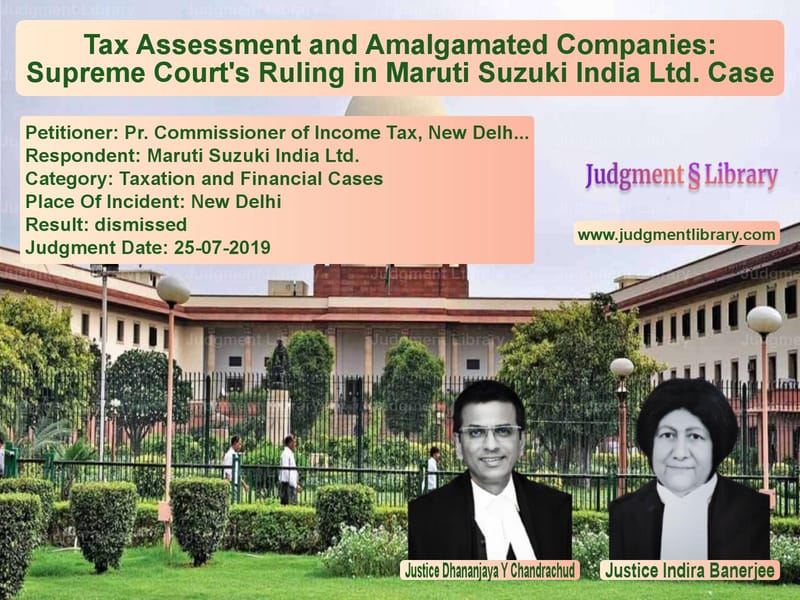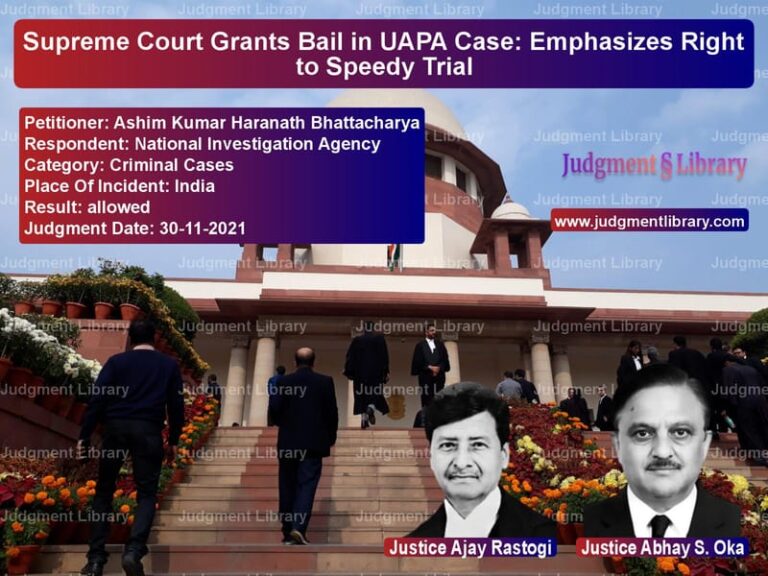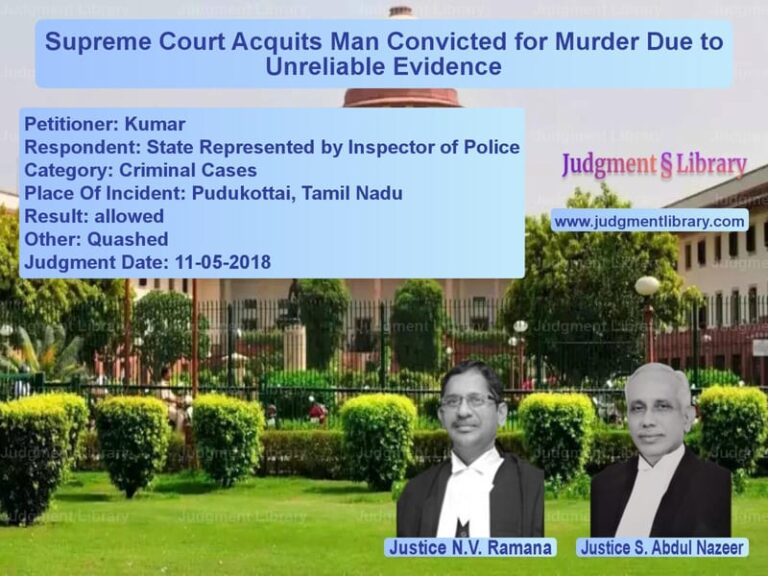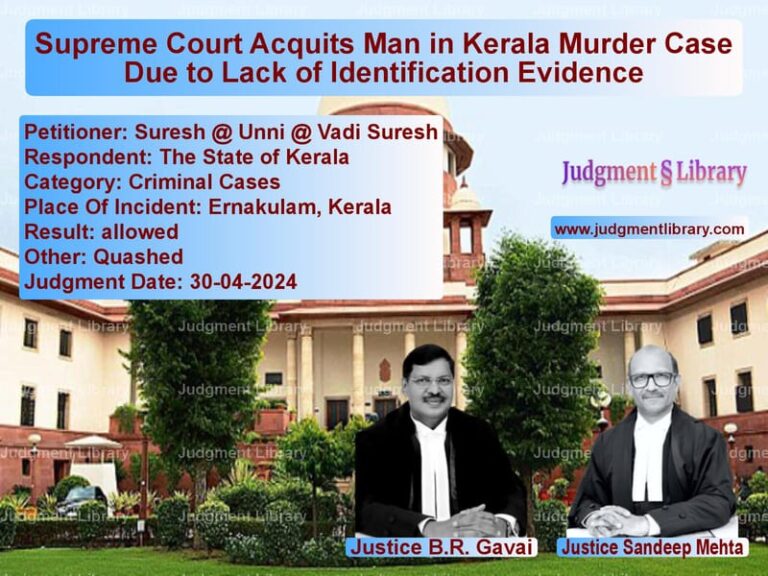Tax Assessment and Amalgamated Companies: Supreme Court’s Ruling in Maruti Suzuki India Ltd. Case
The Supreme Court of India recently delivered a critical judgment in Pr. Commissioner of Income Tax, New Delhi v. Maruti Suzuki India Ltd., addressing whether tax assessments made in the name of a non-existent entity after its merger are legally valid. The case dealt with the assessment of a company that had been amalgamated, raising significant legal questions about the validity of proceedings initiated against a dissolved entity.
Background of the Case
The case arose from an appeal against a judgment by the Delhi High Court, which upheld the Income Tax Appellate Tribunal’s decision declaring the tax assessment on Suzuki Powertrain India Limited (SPIL) as invalid. The High Court reasoned that since SPIL had merged with Maruti Suzuki India Ltd. (MSIL), the assessment could not be made in the name of an entity that no longer existed.
Key events in the case:
- SPIL was initially a joint venture between Suzuki Motor Corporation and MSIL, with Suzuki holding a 70% stake.
- SPIL filed its income tax return for the assessment year 2012-13 in its name on November 28, 2012.
- The Delhi High Court approved the merger of SPIL with MSIL with effect from April 1, 2012.
- MSIL informed the assessing officer of the merger on April 2, 2013.
- The Income Tax Department issued a notice to SPIL under Section 143(2) on September 26, 2013.
- The final assessment order for SPIL was passed on October 31, 2016, despite the company’s legal non-existence.
Key Issues Before the Supreme Court
- Can an assessment be made in the name of a company that has ceased to exist due to amalgamation?
- Does participation in assessment proceedings by the successor company validate proceedings initiated in the name of a dissolved entity?
- Can Section 292B of the Income Tax Act, 1961, which allows for procedural mistakes to be ignored, be applied in such cases?
Arguments by the Petitioner (Income Tax Department)
The tax authorities argued that:
- Even if the assessment was issued in the name of SPIL, the presence of MSIL in the proceedings showed that there was no prejudice.
- The assessment orders mentioned both SPIL and MSIL, making it clear who was being assessed.
- Under Section 292B, mistakes in naming the entity should not invalidate an assessment if the intent of the order remains clear.
- MSIL had actively participated in the assessment proceedings, and thus could not later claim that the assessment was void.
Arguments by the Respondent (Maruti Suzuki India Ltd.)
MSIL, through its counsel, contended:
- SPIL ceased to exist legally from April 1, 2012, as per the amalgamation scheme.
- Any assessment in the name of a non-existent entity is void ab initio and cannot be cured by procedural laws like Section 292B.
- The Supreme Court had previously held in Spice Infotainment Ltd. v. Commissioner of Income Tax that an assessment against a company that no longer exists is a fundamental legal error.
- The tax department was duly informed of the merger, yet continued proceedings against SPIL.
Supreme Court’s Judgment
The Supreme Court ruled in favor of MSIL, upholding the Delhi High Court’s decision. The Court found that:
On the Validity of Assessments on Non-Existent Entities
The Court reaffirmed the principle laid down in Spice Infotainment Ltd.:
“Once a company ceases to exist upon amalgamation, it cannot be treated as a taxable entity for assessment purposes. An assessment order issued in its name is null and void.”
On the Application of Section 292B
The Court rejected the tax department’s reliance on Section 292B, stating:
“Section 292B is meant to rectify procedural errors, not fundamental jurisdictional defects like assessing a non-existent entity.”
On the Participation of MSIL in Assessment Proceedings
The Court dismissed the argument that MSIL’s participation validated the proceedings:
“There can be no estoppel against the law. Participation by the successor company does not validate an inherently defective assessment.”
Key Takeaways from the Judgment
- Jurisdictional Defect: Assessments made on non-existent companies due to amalgamation are void ab initio.
- Failure to Amend Assessment Name: If the tax department is informed of an amalgamation, it must substitute the successor company’s name in all proceedings.
- Section 292B Has Limited Application: It cannot cure fundamental legal errors in assessments.
- Participation Does Not Validate Proceedings: Successor companies are not estopped from challenging assessments issued in the wrong name.
Conclusion
The Supreme Court’s ruling in this case reinforces the necessity of following legal formalities in tax assessments and ensures that businesses are not unfairly subjected to invalid tax proceedings. The judgment strengthens corporate law principles regarding amalgamation and provides clarity on how tax authorities should handle such transitions.
Petitioner Name: Pr. Commissioner of Income Tax, New Delhi.Respondent Name: Maruti Suzuki India Ltd..Judgment By: Justice Dhananjaya Y Chandrachud, Justice Indira Banerjee.Place Of Incident: New Delhi.Judgment Date: 25-07-2019.
Don’t miss out on the full details! Download the complete judgment in PDF format below and gain valuable insights instantly!
Download Judgment: Pr. Commissioner of vs Maruti Suzuki India Supreme Court of India Judgment Dated 25-07-2019.pdf
Direct Downlaod Judgment: Direct downlaod this Judgment
See all petitions in Income Tax Disputes
See all petitions in Tax Refund Disputes
See all petitions in Corporate Compliance
See all petitions in Banking Regulations
See all petitions in Judgment by Dhananjaya Y Chandrachud
See all petitions in Judgment by Indira Banerjee
See all petitions in dismissed
See all petitions in supreme court of India judgments July 2019
See all petitions in 2019 judgments
See all posts in Taxation and Financial Cases Category
See all allowed petitions in Taxation and Financial Cases Category
See all Dismissed petitions in Taxation and Financial Cases Category
See all partially allowed petitions in Taxation and Financial Cases Category







